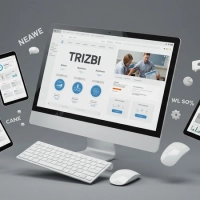
B2B (Business to Business) e-commerce is a trading model in which businesses exchange products or services via digital platforms. The main difference from the B2C (Business to Consumer) model is that the customer base is not individuals but other businesses. For example, a manufacturer selling wholesale materials to another company or a software company offering corporate solutions falls within the scope of B2B e-commerce. This model stands out with its long-term business relationships, high transaction volumes and complex sales processes. Today, b2b e-commerce has become an indispensable part of the business world, especially in areas such as supply chain management and dealer networks.
The importance of B2B e-commerce is becoming more apparent with the acceleration of digital transformation. Companies are turning to this model to optimize the time and cost they lose with traditional methods with automation and integrated systems. For example, tracking inventory instantly with a stock management system or speeding up payment processes with an e-collection system increases the efficiency of B2B operations. In addition, order management, pricing policies and customer relations can be combined on a single platform thanks to b2b software solutions. These digital integrations provide companies with a competitive advantage and offer scalable growth opportunities.
In the following sections, we will detail the integration strategies that will transform your b2b e-commerce processes and how to choose the right tools.
What are B2B E-Commerce Strategies?

Success in B2B e-commerce does not come with random steps; it comes with analysis, flexibility and technology-focused strategies. In order to stay in the competitive market, businesses must understand customer needs, customize their infrastructure and digitalize their processes. In this section, we detail the basic strategies that will strengthen your b2b e-commerce operations.
Target Customer Analysis
Customer segmentation in B2B e-commerce begins with understanding purchasing behavior. For example, a manufacturing company might classify dealer groups as “frequent buyers” and “low-volume buyers.” Customer profiles are created for this analysis using tools such as CRM systems, sales history data, and surveys.
How does the data collected translate into strategy? For example, special discount packages can be designed for “high-volume customers” while loyalty programs can be developed for “low-volume buyers.” Data analysis also optimizes stock planning by revealing which products are in higher demand in which regions.
Customized Infrastructure and Flexibility
B2B ecommerce platforms must be able to adapt to the unique needs of each business. For example, a reseller management system should be able to offer special price lists or payment terms to different customer groups. This flexibility personalizes the customer experience and strengthens long-term relationships.
Integration capability also plays a critical role here. For example, a b2b software integrated with ERP systems allows orders to be automatically transferred to inventory and finance modules. With API-based solutions or tools such as Trizbi, it is possible to establish an infrastructure that works in harmony with existing systems.
Automation and Digitalization
Automation in B2B e-commerce processes saves both time and money. For example, automating all steps from order confirmation to invoicing minimizes human errors. An inventory management system can predict when products are running out and create automatic orders.
Advantages of automation:
- Worker productivity increases for repetitive tasks.
- With the e-collection system, payments are tracked instantly and delays are prevented.
- Satisfaction increases by providing instant responses to customer demands.
Integrated solutions make automation even more powerful. For example, a b2b software brings together the seller and buyer on the same platform and manages processes from a single source.
The Most Effective B2B E-Commerce Integrations

Operational efficiency and customer satisfaction in B2B e-commerce are not possible without the right integrations. When every step from supply chain to payment processes is optimized with integrated systems, businesses save both time and resources. In this section, you will discover the most effective integrations and their tangible benefits that will transform your b2b e-commerce processes.
ERP Integration
ERP (Enterprise Resource Planning) integration combines critical processes such as finance, inventory, orders, and customer relations into a single platform. For example, when you integrate ERP with an inventory management system, orders automatically update stock levels and send notifications to the purchasing team.
Benefits:
- Financial data and stock movements are synchronized in real time.
- Ordering and invoicing processes are free from human error.
- Data deduplication between different departments is prevented.
Sample Scenario:
By connecting its ERP to its b2b e-commerce platform, a manufacturing company automatically transfers dealer orders to production planning. This way, production orders are created in advance for products that are out of stock, reducing delivery times by 30%.
CRM Integration
CRM (Customer Relationship Management) integration provides a strategic advantage to sales and marketing teams by centralizing customer interactions. For example, when you integrate a CRM with a dealer management system, communication history and purchasing trends specific to each dealer can be tracked.
Benefits:
- Personalized campaigns are designed with customer segmentation.
- The sales team provides more effective quotes based on historical order data.
- Customer complaints are resolved quickly.
Sample Scenario:
A distributor integrates CRM with b2b software to automatically send discount coupons to frequent customers, increasing repeat sales by 40%.
Cargo and Logistics Integration

Cargo integration reduces logistics costs by automating post-order processes. For example, when the order is completed, an automatic notification is sent to the cargo company and the tracking number is reflected in the customer panel.
Benefits:
- Orders are delivered to cargo immediately and delays are reduced.
- Customer can view the cargo status in real time from the panel.
- By eliminating manual data entry, the risk of operational errors is reduced.
Sample Scenario:
A wholesaler integrates its b2b e-commerce platform with the API of a shipping company. When an order is placed, the packaging and shipping process is automatically initiated. This reduces the delivery time from 2 business days to 1.
Online Payment Systems Integration
E-collection system integration speeds up payment processes and increases security. With multi-currency support, international payments can also be made without any problems.
Benefits:
- Instant payment confirmation is provided through virtual POS or API connections.
- Recurring payments (subscriptions) are automated.
- Financial reporting is centralized and transparency is increased.
Sample Scenario:
An export company can receive online payments in 5 different currencies through b2b software. When customers pay by credit card or bank transfer, the system automatically issues an invoice and deducts the amount from the stock.
You can discover more details on the subject in our article titled B2B System Management with ERP Software .























